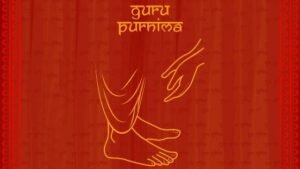By: Dr. A. Ramaswamy Iyengar
The scenes of Guru Poornima celebrations across the country and the world appear to carry one message, ‘Life is life with others.’ It is life from, for, and with one another. Human life is always lived in communities. We are social beings. Even the Divine Guru Dakshina Moorthy loves the one who loves other beings, and man’s glory lies in being a member of a big family.

On the one hand, we are bound by Guru Disciple relationship ties – parents, spouse, and children; on the other, we are linked with every individual in society, whether near or far. It is given to man to link himself with those who constitute his ancestry in the form of a ‘Gothra’ to a particular Sage and to think of those who could be his posterity. Marriages are performed depending on this lineage. Therefore, we should live, work, and die for society by rising above our kinship. Vidura Niti says: ‘Sacrifice the interest of an individual for the sake of the family; sacrifice the interest of the family for the sake of the village; sacrifice the interest of the village for the sake of the country.’
Sai Maharaj implores us to rise above kinship in the larger interest of society and consider the entire universe as our family in the spirit of Vasudhaiva Kutumbakam. This philosophy of Sai Satcharitra transcends man-made boundaries of caste, origin, religion, race, and geographical divisions.On ‘Guru Poornima’ day Sai Maharaj told his devotees about an incident in Mahabharata. While in exile, Kunti and the five Pandavas had to take up different jobs for their sustenance by concealing their true identities. One day, Kunti saw the lady of the house where she was employed, weeping profusely. When inquired, the woman who was a widow shared her impending misfortune with Kunti and said that there lives a demon nearby, who would often attack their village, looting and devouring the villagers. When villagers pleaded with him to stop wanton killings, the demon agreed but on the condition that once a month, the villagers on their own accord would send to him one person for him to feed on, along with grains and other eatables for his monthly requirement. This coming month, it was the turn of her family to sacrifice a family member. Since her son was her only surviving kin, she would lose everything and be rendered childless.
own accord would send to him one person for him to feed on, along with grains and other eatables for his monthly requirement. This coming month, it was the turn of her family to sacrifice a family member. Since her son was her only surviving kin, she would lose everything and be rendered childless.
Kunti was moved. Full of gratitude for that woman, she thought, ‘I have five sons even if I lose one still, I’d be left with four, but this widow would become childless, I should help her out.’ She consulted her sons. All of them eagerly offered to go instead of the widow’s boy, but Kunti chose Bhima, because of his prowess in one-to-one combat. Rest, we all know. But the point is that Kunti was willing to sacrifice her son for the larger good.
The hymn,

Leave a Reply